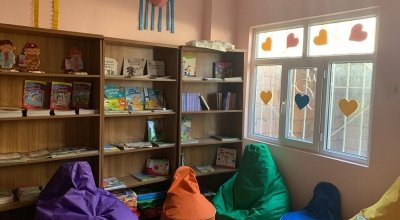
Read our 2024 annual report

Knowledge Hub
In October, Dublin footballer Michael Darragh Macauley travelled to Iraq with Concern to meet with Syrian families who had been forced to flee their homes as a result of the conflict.
Our Director of Communications Sarah Martin, who accompanied Michael Darragh on the trip, recounts their visit.
When we got out of the van in Barderash refugee camp in the arid land of Northern Iraq, the warmth of the sun immediately hit us. It was about 26c but Concern’s liaison officer, Yahir*, told us that the rains would arrive in fifteen days and then it would rain almost non-stop for four months, wreaking havoc with floods and mud destroying the flimsy camp shelters.
I was there with Concern ambassador and Dublin footballer Michael Darragh Macauley, who had travelled to Iraq to see the reality of life for Syrian refugees.
As we walked through the camp, we saw children and mothers queuing up to get their five-litre jerry cans filled up with kerosene fuel for their stoves. Children as young as five walked past us carrying jerry cans or stacks of blankets on their heads; items that would help to keep these Syrian families warm during the cold winter ahead.
There are approximately 14,000 refugees living in Barderash camp, all of them Syrian. Most of them abandoned their homes when the nine-year crisis erupted once again with more bombing and shelling. After crossing over the border in desperation, they arrived here in the last few weeks.
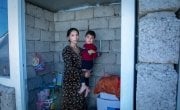
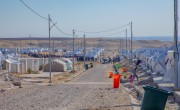
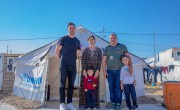
Yahir brought us to the tent of Hassan* and Amal. Hassan, from Northern Syria, had worked for many years as a professional driver in his hometown, transporting parts from one part of the city to the other.
Then, in 2018, he was recruited by Concern as a driver and worked full time for our organisation, bringing staff and supplies to vulnerable communities and refugee camps.
Hassan introduced us to his wife, Amal, and their two little boys Amez (seven years old) and Hevi (three years old), who had arrived here in Barderash camp just two weeks ago, following a treacherous journey.
Hassan told us that, up until the beginning of October, his town was very peaceful.
“Christians, Arabs, Kurds – we all lived together and we all lived in harmony. We were living in peace, like one big family, getting on with normal life. We didn’t think anything bad could happen but one night, everything changed. Our town was targeted and the bombs and shelling started.”
Seven-year-old Amez had just started primary school and was really enjoying it but as airplanes circled overhead, Hassan made the tough decision to flee with his family.
“I was lucky. I had my own car. Many in the town had no way to leave at all.”
Hassan first drove to a village 30km away. He and Amal were worried about Hevi as he had a stomach infection and was not at all well.
They stayed in this village for a week but there was nothing there and Hevi was not getting better. Hassan then decided to head east with his family towards the Iraqi border.
Once they reached a village close to the border, they managed to get a horse and donkey. They travelled late at night in the dark to get across the border. Hevi had a sick stomach and was crying out in pain all the time. Amal felt very afraid that, at some point, they would have to turn back.
They eventually got over the border where they were brought to the UNHCR Reception Centre.
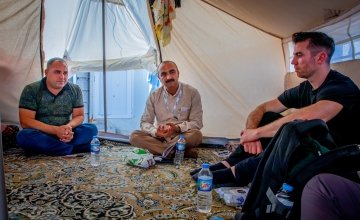
“We were so relieved when we got over the border. We stayed one night at the UNHCR reception centre and then we were brought by bus here to Barderash. When we arrived here, we got food, we were registered and given ID cards, blankets and some cooking utensils.”
Michael Darragh asked Hassan: “What are your hopes for the future?”
“We were living in peace," replied Hassan. “But now everything has changed. We are hopeless.”
It is now two weeks since Hassan and Amal and their boys arrived in Bardarash. Amal tells us that Hevi is feeling much better and his stomach problems are better. She is glad that they are finally safe.
Hassan and Amal are just one of millions of Syrian families living in unimaginable conditions as a result of conflict.
*All names have been changed to protect the identities of our beneficiaries
We need your help
Concern is working hard in Iraq, Syria and Lebanon to help these families with education, shelter and livelihood support. This Christmas, we want to ensure that every family has a warm and safe place to live… but we need your help.
Donate now to provide lifesaving essentials such as blankets and shelter kits to Syrian families.
Our impact in 2024
people reached through our emergency response
people reached through our health interventions
people reached through our livelihoods programmes




